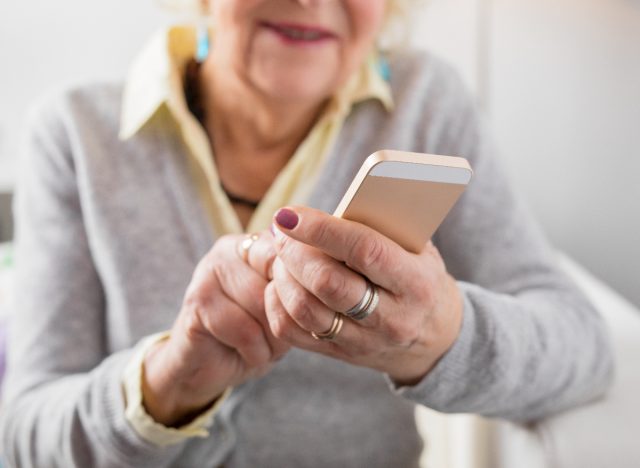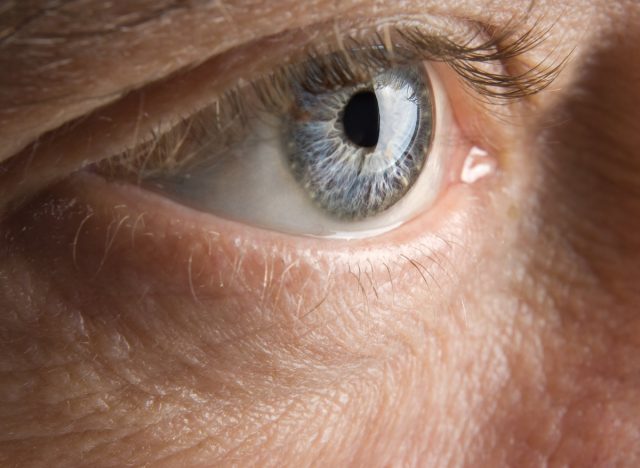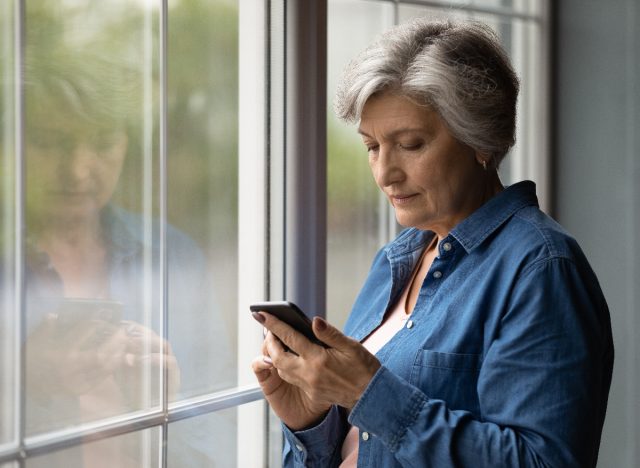This New Way To Self-Detect Alzheimer’s Is Groundbreaking

There’s a brand new smartphone app researchers have come up with, and it’s quite extraordinary. By taking a selfie of your eyes, this app can help your smartphone detect possible neurological disorders and diseases, including Alzheimer’s, ADHD, and more. According to ScienceDaily, scientists from the University of California—San Diego have found a way for smartphones to record how an individual’s pupil alters in size, which can be indicative of a neurological condition. Read on to learn more, and next, be sure to check out The 6 Best Exercises for Strong and Toned Arms in 2022, Trainer Says.
This app is groundbreaking

This news is truly groundbreaking, considering there’s presently not one test that diagnoses dementia, according to Alzheimer’s Association. And as far as ADHD (Attention Deficit Hyperactivity Disorder) is concerned, the condition is commonly unrecognized. Detecting a sign on your own early on is such a beneficial tool for cognitive wellness.
Related: Drink This Much Water Each Day To Prevent Heart Failure, New Study Says
Here’s how the app works

If you’re curious about how the app works, we have the scoop. The method involves taking a color recording of your eyes using the app on your smartphone. Since newer phones have a near-infrared camera built right into them, photos can detect the difference between your pupil and iris, regardless of eye color. The app can accurately establish the size of your pupil.
The process measures the exact distance between you and your smartphone, and your pupil size is ultimately converted into millimeters. (The measurements on the app replicate those of a pupillometer, a relied-upon tool used for measuring the size of a pupil). Essentially, any detected changes in measurements discovered by the app can be indicative of cognitive disorders.
The app was designed for easy use, with the user in mind

Colin Barry, first author of the study and electrical and computer engineering Ph.D. student at UC San Diego explains, “While there is still a lot of work to be done, I am excited about the potential for using this technology to bring neurological screening out of clinical lab settings and into homes.” Barry adds, “We hope that this opens the door to novel explorations of using smartphones to detect and monitor potential health problems earlier on.”
The app was designed with easy use in mind. According to Barry, “For us, one of the most important factors in technology development is to ensure that these solutions are ultimately usable for anyone. This includes individuals like older adults who might not be accustomed to using smartphones.”
Related: The 4 Most Effective Exercises To Shrink Your Waistline After 60
This is an easily-accessable, cost-effective way to self-screen for Alzheimer’s

According to ScienceDaily, recent studies have revealed the size of your pupils can supply a wealth of information when it comes to possible neurological disorders. For example, your pupils typically get bigger when you’re startled by a sound. A medical professional can perform a pupil response test to record any variant in someone’s pupils. It’s an easy method to detect and diagnose a variety of neurological disorders and diseases. The problem with the test is the equipment cost makes it prohibitive to be done in a non-clinic or laboratory setting. This prompted joint research between UC San Diego Center for Mental Health Technology (MHTech Center) researchers and Digital Health Lab engineers in an effort to create something more within reach as far as cost and accessibility.
Edward Wang, the UC San Diego electrical and computer engineering professor who led the Digital Health Lab team, explains, “By testing directly with older adults, we learned about ways to improve our system’s overall usability and even helped us innovate older adult specific solutions that make it easier for those with different physical limits to still use our system successfully.” Wang adds, “When developing technologies, we must look beyond function as the only metric of success, but understand how our solutions will be utilized by end-users who are very diverse.”
Psychiatry professor at UC San Diego School of Medicine and director of the MHTech Center Eric Granholm, explains, “A scalable smartphone assessment tool that can be used for large-scale community screenings could facilitate the development of pupil response tests as minimally-invasive and inexpensive tests to aid in the detection and understanding of diseases like Alzheimer’s disease. This could have a huge public health impact.”









